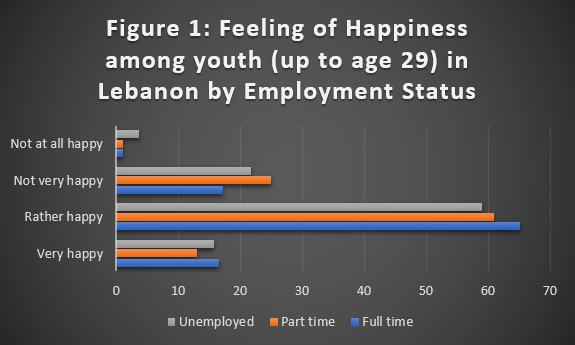How Do Unemployment and Conditions of Employment Affect the Health of the Youth in the Arab Countries in Light of the Results of the Arab Human Development Report?
The 2016 Arab Human Development Report: Youth and the Prospects for Human Development in a Changing Reality was published recently. The report points out several significant facts that can be linked to one another and places them within one framework in order to attain new results. First, the population in the Arab region is witnessing a rapid increase and the proportion of young people aged between 15-29 is close to 60%, which is the highest in the world.
Second, the youth unemployment in the Arab region is one of the major challenges; in 2014, the rate of unemployment among the youth reached 30%, and this percentage is double that of the global average. According to the Arab Human Development Report (AHDR), half of the youth in some of the Arab countries experiences a period of unemployment that exceeds one full year, before finding a job. The report also indicates that university graduates in the Arab region are having to work in the informal sector with low wages and in poor working conditions. It also points out that nepotism (Wasita) plays a major role in getting a job, which provides the young people from prominent families with precedence over their colleagues, which in turn undercuts the principle of social justice.
Third, the report points out the increase in the ratios of smoking as well as substance and alcohol abuse among the youth. For instance, the burden of disease related to drug abuse and psychological distress in the Arab countries has risen from 4% in 1990 to 7% in 2013(1); the report recommends raising taxes on tobacco and warning about its danger.
Last but not least, the report calls attention to issues of psychological well-being among the youth. For example, it showcases that the prevalence of depression symptoms among school students aged between 14-20 years in Oman is at 19% among girls and 15% among boys. In Lebanon, the sense of happiness among the youth (under the age of 29) is linked to the employment status; young people who work full-time are happier that those who are unemployed or have a part-time job, and vice versa.

Source: Global Values Survey 2014
Putting these facts together, we find that the prevalence of smoking and substance abuse, the increasing rates of depression among young people, and other health aspects are closely related to the conditions of the labor market and employment, not only used in terms of finding a job that provides income, but also in terms of job security, wage level, working environment in the formal sector, social security and health insurance. Looking at the relationship between unemployment and individual health, we find that unemployment has several negative effects on human health. This is due to the fact that employment does not only provide the individual with the opportunity to earn an adequate income, but also has non-material returns such as social status, self-realization and time management.
Therefore, loss of employment and long-term unemployment do not only mean loss of livelihood, but also entail major psychological and social pressures at the individual and family levels and their negative effects on mental health.
Unemployment also represents a loss of those intangible benefits, which can cause depression and frustration at the individual and family level. For example, a recent study in Germany found that the impact of job loss had a strong negative impact not only on the mental health of the worker but also on that of their spouse (2). Looking at workers in the informal sector-which is sought by most the young people in the Arab region as an unavoidable option, as the report notes, they lack job security and are under constant threat of dismissal. This constant sense of the possibility of dismissal from work leads to an ongoing sense of anxiety and discomfort, which may lead individuals to resort to smoking, alcoholism and substance abuse to cope with stress resulting from the lack of job security (3).
In light of the facts provided by the recently published Arab Human Development Report (AHDR) on unemployment and employment conditions in the Arab region, it can be said that improving mental health, combating smoking and addiction is not limited to direct health policies from the health sector, such as raising taxes on smoking as the report indicates; this should entail interventions from outside the health sector, such as improving working conditions and reducing unemployment.
References
- Mokdad AH, Forouzanfar MH, Daoud F, Mokdad AA, El Bcheraoui C, Moradi-Lakeh M, et al. Global burden of diseases, injuries, and risk factors for young people's health during 1990–2013: a systematic analysis for the Global Burden of Disease Study 2013. The Lancet. 2016.
- Marcus J. The effect of unemployment on the mental health of spouses–Evidence from plant closures in Germany. Journal of Health Economics. 2013;32(3):546-58
- Jung Y, Oh J, Huh S, Kawachi I. The Effects of Employment Conditions on Smoking Status and Smoking Intensity: The Analysis of Korean Labor & Income Panel 8 th–10 th Wave. PloS one. 2013;8(2):e57109
Ahmed Rashad is a researcher in development economics, health economics, and applied econometrics. He holds a PhD in Economic Development and Socio-economic Inequalities in Health.
The views expressed here are solely those of the author in his/her private capacity and do not in any way represent the views of neither the Arab Development Portal nor the United Nations Development Programme.
